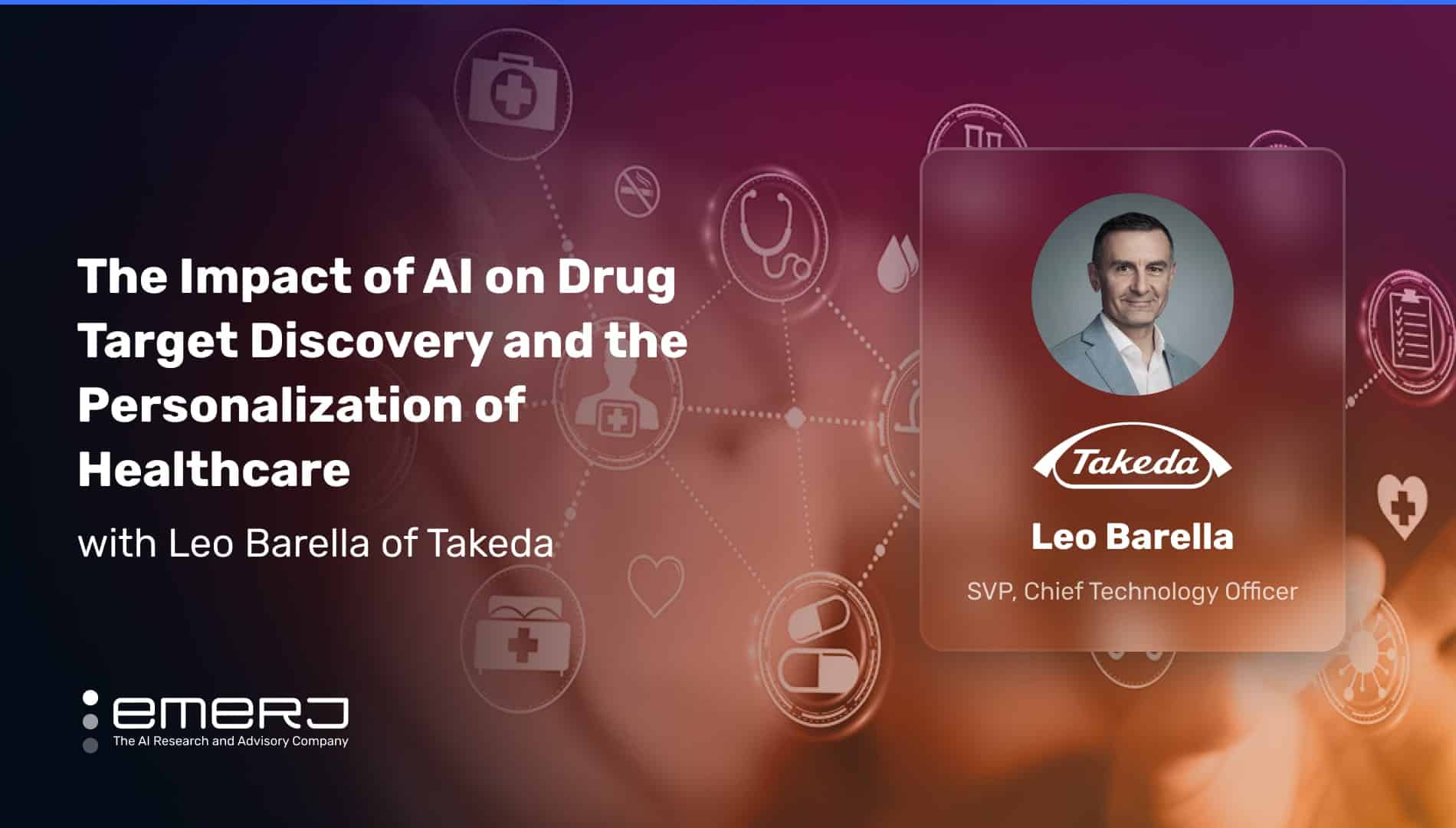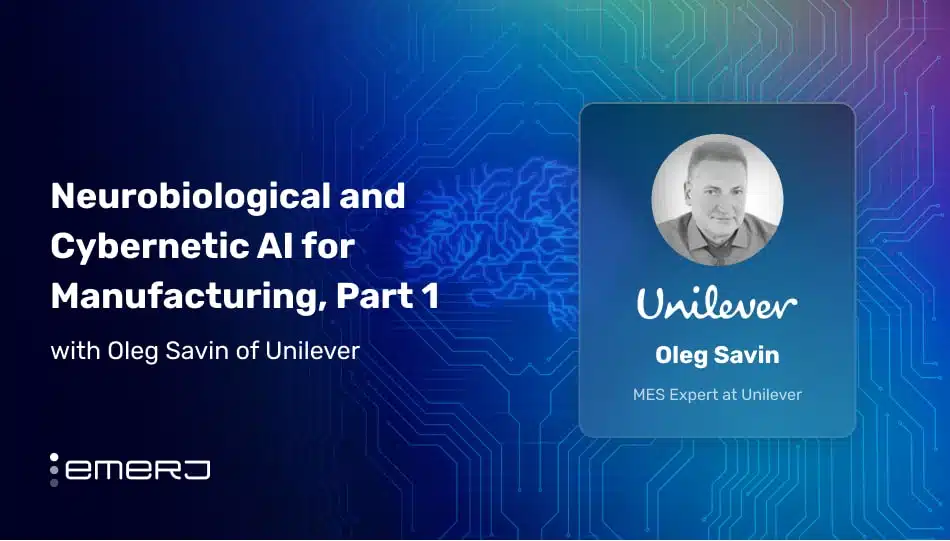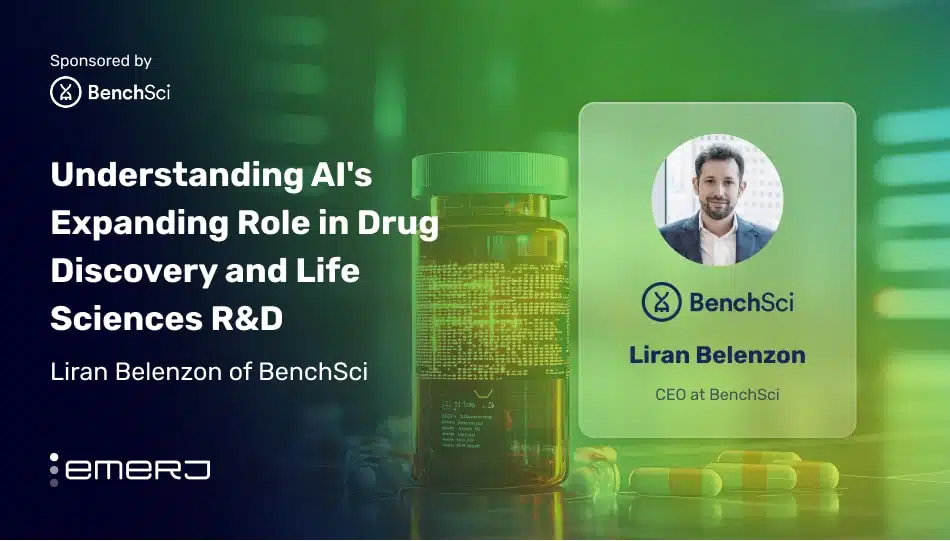AI has profound implications for drug discovery, ushering in a new era of innovation and efficiency. Recent milestones – such as the first AI-designed drug molecule to enter human clinical trials and the prediction of protein structures for millions of proteins – showcase the transformative power of AI in this domain.
Investors increasingly recognize the potential of AI-enabled drug discovery, with significant investments pouring into the industry. Lower development costs and shorter timelines promise increased drug accessibility and the potential to treat currently incurable conditions. However, this advancement also brings challenges, including the availability of suitable data, ethical considerations, misuse risks, and ensuring drug safety and efficacy.
Emerj Senior Editor Matthew DeMello recently spoke with Leo Barella, Senior Vice President and Chief Technology Officer at Takeda, on the ‘AI in Business’ podcast to discuss the role of AI in healthcare, the importance of quality data for training AI models, and the challenges in addressing rare diseases.
In the following analysis of their conversation, we examine three key insights:
- The impact of increased personal data: The increasing prevalence of consumer devices generates vast amounts of individual data, enabling targeted healthcare interventions and advancements in precision medicine.
- Identifying rare diseases: The utilization of comprehensive data models enables the identification of patterns and facilitates addressing the needs of patients with rare diseases on a broader scale.
- Human and expert feedback: Establishing synergy between human intelligence and AI in problem-solving because AI learns differently from humans, and human guidance is pivotal in shaping and refining AI models.
Listen to the full episode below:
Guest: Leo Barella, Senior Vice President and Chief Technology Officer at Takeda
Expertise: Business intelligence, IT strategy and Enterprise Architecture.
Brief Recognition: Leo has spent four years at Takeda as a Senior Vice President and Chief Technology Officer. He earned his master’s in Telecommunications from Università di Pavia in Pavia, Lombardia. Recently, he earned a certificate from MIT Sloan School of Management in AI in healthcare.
The Impact of Increased Personal Data
Leo begins by establishing the crucial role of data and effective data management in the application of AI. According to Leo, AI’s success is highly dependent on the availability and handling of data. He draws attention to the increasing prevalence of consumer-grade devices that generate vast amounts of data about individuals.
These devices collect data on various aspects of people’s lives, such as their growth, development, demographics, climate, and daily activities. He suggests that this abundance of data allows for specific outcomes and insights based on individual characteristics. He highlights the significance of both genomic and biome data. The data obtained from an individual’s genetic information and microbial composition in their body contribute to drug development and aid in understanding individual health conditions.
Barella further explains that personal choices, including dietary preferences, lifestyle decisions, and stress levels, influence healthcare outcomes—the data generated from these choices present opportunities for more targeted and personalized healthcare interventions.
Moreover, Leo discusses the increasing focus on clinical data, which involves using specialized devices in hospital or laboratory settings to generate high-quality data. Electronics, sensors, and equipment advancements have improved data collection and measurement accuracy and reliability.
He notes that while technology has advanced to process large amounts of information, more reliable data still needs to be. Collecting and understanding the data required to solve and fully comprehend complex problems often takes a lifetime.
Leo highlights the challenge of gathering longitudinal data throughout an individual’s lifetime to accurately assess the choices and modifications that impact their biome. He mentions that the critical point lies in the quality of data and the ability to differentiate between different disease states.
He gives an example of how disease categorizations have evolved from a general disease of the blood to more precise classifications like hemophilia. The increased precision in data collection and measurement enables the identification of differences that respond better to specific therapies.
Leo mentions that medical imaging is one of the best applications of AI. AI algorithms can analyze vast amounts of imaging data to identify patterns and distinguish between various conditions. By precisely defining data sets and training AI models with this data, there is potential to reach deterministic disease assumptions.
He discusses the current stage of using AI in healthcare and highlights some challenges and considerations. He states that at this stage, AI in healthcare is still more of an art than a science, particularly in the initial patient identification phase.
The reliance on human knowledge and the instincts of doctors and healthcare professionals is due to the lack of a standardized way to measure and identify patients. The decision-making process relies heavily on the expertise and experience of medical practitioners in recognizing patterns and symptoms.
Leo shares that data are scarce for rare diseases and specific therapies. This limitation inhibits the ability of AI to improve the precision and efficacy of treatments. The data sets available still need to be more extensive to fully leverage AI technology in these areas, especially for rare diseases that require specialized attention. He believes that a large amount of high-quality data is essential to trust the predictions of AI models.
Leo suggests collaboration and partnerships across companies will be vital in advancing AI in healthcare. He argues that instead of each pharmaceutical company training its own specific AI models for a particular therapy area, there will be a need for orchestration and cooperation.
Companies can pool resources, expertise, and data through partnerships to develop more robust and accurate models. Leo predicts a potential explosion of microservices and specialized companies that focus on specific therapy areas and monetize the precision and effectiveness of their AI models. This collaborative approach can lead to more comprehensive and impactful advancements in the industry.
Addressing Identifying Rare Diseases
Later in the episode, Leo goes on to discuss the challenges in identifying and treating rare diseases, explaining that a condition is considered rare not because it affects only a specific percentage of the population. What truly makes a disease rare, according to technical healthcare standards, is that a pattern has yet to be established across the medical community to recognize it distinctly based on symptoms.
To address the nature of the problem, Leo emphasizes the importance of generating data and creating awareness within the medical community about the distinct features and symptoms of the rare disease. This leads to testing and the development of diagnostic tests to confirm the likelihood of the disease in an individual.
By training physicians and improving their ability to recognize the disease, the number of identified cases increases, expanding the population affected by the disease.
As the number of identified cases grows, the effectiveness of therapies can be evaluated, allowing for scaling and broader distribution of treatments. Leo also mentions that combining diagnostic tests and ensuring accurate identification of the disease in individuals is crucial. As more data is collected and patterns emerge, the ability to identify and address the condition’s cause improves, resulting in extensive testing across diverse markets and regions globally.
He tells Emerj that through the accumulation of data and the development of robust models, rare diseases can become better known and understood. The utilization of comprehensive data models enables the identification of patterns and facilitates addressing the needs of patients with rare diseases on a broader scale.
Leo discusses a shift in the approach of pharmaceutical companies toward digital solutions. Takeda is taking a different approach. They have developed a program called Target Digital Product Profile, which focuses on the patient experience and incorporates all aspects of patient care, going beyond just the product’s effectiveness.
According to Leo, a digital product profile should address the patient’s comprehensive needs, including factors contributing to the disease and mitigating any side effects or other effects that could impact the patient’s condition. It aims to provide a holistic solution that enhances the overall patient experience.
Leo gives an example of a digital product in Japan that includes features for scheduling the collection of needles used for injections. Disposing of needles can burden some patients, and Takeda aims to minimize the impact of such tasks on their daily lives.
Human and Expert Feedback
Lastly, Leo discusses the relationship between humans and AI in problem-solving and service provision. He explains that humans can visually problem-solve and provide services, while AI can process information faster and perform better given the correct data. However, combining AI and human intelligence is even more potent than either alone.
He emphasizes the importance of humans continuing to train AI and playing a companion to the technology. He notes that AI does not learn the same way humans do. Therefore, human involvement is crucial in shaping and training AI models.
Leo highlights the ethical component that Takeda considers in their approach. They prioritize patient trust, reputation, and putting patients first. However, Leo also expresses excitement about the potential of AI capabilities, such as GPT (referring to the language model GPT-3).
He tells Emerj how Takeda is exploring how AI can enhance the performance of their employees across different areas, from research and development to communication with patients. They take a persona-based approach to leverage AI technology and accelerate the company’s progress.


















